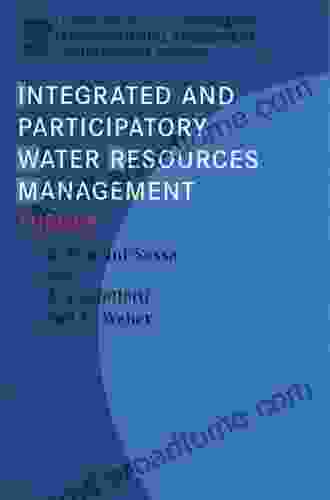Integrated and Participatory Water Resources Management Theory: A Comprehensive Guide to Sustainable Water Management

In the face of increasing water scarcity, pollution, and climate change, traditional water management approaches have proven inadequate. To address these pressing challenges, Integrated and Participatory Water Resources Management (IPWRM) theory has emerged as a game-changer. IPWRM is a holistic approach that integrates technical, social, economic, and environmental aspects of water management, while actively involving all stakeholders in the decision-making process.
4.8 out of 5
| Language | : | English |
| File size | : | 13859 KB |
| Text-to-Speech | : | Enabled |
| Screen Reader | : | Supported |
| Enhanced typesetting | : | Enabled |
| Word Wise | : | Enabled |
| Print length | : | 1126 pages |
Key Principles of IPWRM Theory
The core principles of IPWRM theory include:
- Integration: Recognizing the interconnectedness of water resources and managing them as a whole system, rather than fragmented parts.
- Participation: Engaging all stakeholders, including local communities, in the planning and implementation of water management strategies.
- Equity: Ensuring that the benefits of water resources are shared equitably among all users, regardless of social or economic status.
- Sustainability: Managing water resources in a way that meets the needs of present and future generations without compromising the environment.
- Adaptive Management: Continuously monitoring and evaluating water management practices and making adjustments as needed to respond to changing conditions.
Benefits of IPWRM Theory
Implementing IPWRM theory offers numerous benefits, including:
- Improved water security: By integrating all aspects of water management, IPWRM ensures that water resources are managed in a way that meets both current and future needs.
- Enhanced water quality: Participatory processes and stakeholder involvement help address water pollution concerns and protect water sources.
- Reduced conflicts: IPWRM's collaborative approach fosters communication and understanding among stakeholders, reducing conflicts over water resources.
- Increased efficiency: By integrating different water management sectors, IPWRM eliminates redundancies and improves overall efficiency.
- Improved water governance: Participatory processes empower local communities and strengthen water governance structures.
Case Studies of Successful IPWRM Implementation
Numerous case studies worldwide demonstrate the successful implementation of IPWRM theory. These include:
- Lake Victoria Basin, East Africa: The Lake Victoria Basin Commission has implemented IPWRM principles to address water scarcity, pollution, and conflicts in the region.
- Mekong River Basin, Southeast Asia: The Mekong River Commission has adopted IPWRM to manage the basin's water resources sustainably and equitably.
- Great Lakes Region, United States and Canada: The Great Lakes Water Quality Agreement has incorporated IPWRM principles to improve water quality and protect the region's water resources.
- Murray-Darling Basin, Australia: The Murray-Darling Basin Authority has implemented IPWRM to address over-extraction and water scarcity issues in the basin.
- Singapore: Singapore has adopted IPWRM to manage its scarce water resources through a combination of advanced technologies and participatory processes.
Integrated and Participatory Water Resources Management (IPWRM) theory is a transformative approach that has the potential to revolutionize water management practices worldwide. By integrating technical, social, economic, and environmental aspects of water management, while actively involving all stakeholders, IPWRM can ensure water security, enhance water quality, reduce conflicts, increase efficiency, and improve water governance. As the world faces increasing water challenges, IPWRM theory provides a comprehensive and sustainable solution to managing this precious resource.
4.8 out of 5
| Language | : | English |
| File size | : | 13859 KB |
| Text-to-Speech | : | Enabled |
| Screen Reader | : | Supported |
| Enhanced typesetting | : | Enabled |
| Word Wise | : | Enabled |
| Print length | : | 1126 pages |
Do you want to contribute by writing guest posts on this blog?
Please contact us and send us a resume of previous articles that you have written.
 Book
Book Novel
Novel Page
Page Chapter
Chapter Text
Text Story
Story Genre
Genre Reader
Reader Library
Library Paperback
Paperback E-book
E-book Magazine
Magazine Newspaper
Newspaper Paragraph
Paragraph Sentence
Sentence Bookmark
Bookmark Shelf
Shelf Glossary
Glossary Bibliography
Bibliography Foreword
Foreword Preface
Preface Synopsis
Synopsis Annotation
Annotation Footnote
Footnote Manuscript
Manuscript Scroll
Scroll Codex
Codex Tome
Tome Bestseller
Bestseller Classics
Classics Library card
Library card Narrative
Narrative Biography
Biography Autobiography
Autobiography Memoir
Memoir Reference
Reference Encyclopedia
Encyclopedia C Wess Daniels
C Wess Daniels Carla Stecco
Carla Stecco Caroline Seebohm
Caroline Seebohm Bryan P Cafferky
Bryan P Cafferky Nitin Vengurlekar
Nitin Vengurlekar Fabrice Testa
Fabrice Testa Bryan Anderson
Bryan Anderson Bruce T Marshall
Bruce T Marshall Cary Sneider
Cary Sneider Carla Mashinski
Carla Mashinski Friedrich Winkler
Friedrich Winkler Britt Frank
Britt Frank Caroline Archer
Caroline Archer C Mahoney
C Mahoney Catherine Armitage
Catherine Armitage Tommy Chheng
Tommy Chheng Sarah E Baires
Sarah E Baires Michael Dempsey
Michael Dempsey Michael Jibrael
Michael Jibrael Bronwen Stiene
Bronwen Stiene
Light bulbAdvertise smarter! Our strategic ad space ensures maximum exposure. Reserve your spot today!

 Jan MitchellUnlock the Secrets of Credit Sales: Mastering Risk Management and Collections
Jan MitchellUnlock the Secrets of Credit Sales: Mastering Risk Management and Collections
 Wesley ReedUnlocking the World of Language: Children Speech Sound Disorders by Caroline...
Wesley ReedUnlocking the World of Language: Children Speech Sound Disorders by Caroline... Jonathan FranzenFollow ·6.9k
Jonathan FranzenFollow ·6.9k Pete BlairFollow ·9.4k
Pete BlairFollow ·9.4k Jaylen MitchellFollow ·17.1k
Jaylen MitchellFollow ·17.1k Dustin RichardsonFollow ·10.9k
Dustin RichardsonFollow ·10.9k Benjamin StoneFollow ·18.5k
Benjamin StoneFollow ·18.5k Thomas MannFollow ·13.4k
Thomas MannFollow ·13.4k George R.R. MartinFollow ·11.6k
George R.R. MartinFollow ·11.6k Fredrick CoxFollow ·12.7k
Fredrick CoxFollow ·12.7k

 Shawn Reed
Shawn ReedEmbark on a Transformative Journey: Discover Ritual...
Delve into the Enigmatic World of...

 Connor Mitchell
Connor MitchellUnleash Your Soul: A Journey to Less Noise, More Soul
Embrace the Power of Silence...

 Derek Cook
Derek CookRitual Theory, Ritual Practice: Unlocking the Secrets of...
Rituals have been an...

 Evan Hayes
Evan HayesStop the Itch: Simple Steps to Lasting Relief
Itching, an...

 Herman Mitchell
Herman MitchellThe Ultimate Premarital Guide: Your Essential Wedding...
Congratulations on your engagement! This is...

 DeShawn Powell
DeShawn PowellUnlocking the Enigma of the Mantle: A Deep Dive into "The...
Our planet,...
4.8 out of 5
| Language | : | English |
| File size | : | 13859 KB |
| Text-to-Speech | : | Enabled |
| Screen Reader | : | Supported |
| Enhanced typesetting | : | Enabled |
| Word Wise | : | Enabled |
| Print length | : | 1126 pages |








